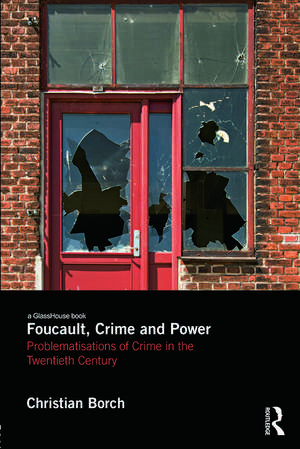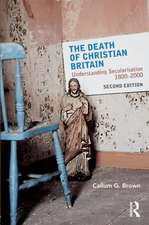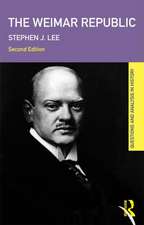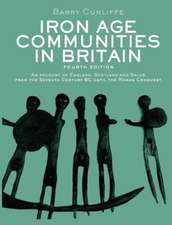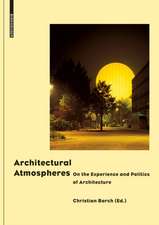Foucault, Crime and Power: Problematisations of Crime in the Twentieth Century
Autor Christian Borchen Limba Engleză Hardback – 18 noi 2014
Christian Borch shows how the tendency of criminologists to focus on either disciplinary power or governmentality has neglected the broader complex of Foucault’s concerns: ignoring its historical underpinnings, whilst for the most part limiting studies to only very recent developments, without giving sufficient attention to their historical backdrop. The book uses developments in Denmark – developments that can be readily identified in most other western countries – as a paradigmatic case for understanding how crime has been problematised in the West. Thus, Foucault, Crime and Power: Problematisations of Crime in the Twentieth Century demonstrates that a Foucauldian approach to crime holds greater analytical potentials for criminological research than have so far been recognized.
| Toate formatele și edițiile | Preț | Express |
|---|---|---|
| Paperback (1) | 464.02 lei 6-8 săpt. | |
| Taylor & Francis – 11 mai 2016 | 464.02 lei 6-8 săpt. | |
| Hardback (1) | 1045.39 lei 6-8 săpt. | |
| Taylor & Francis – 18 noi 2014 | 1045.39 lei 6-8 săpt. |
Preț: 1045.39 lei
Preț vechi: 1274.87 lei
-18% Nou
Puncte Express: 1568
Preț estimativ în valută:
200.20€ • 204.29$ • 168.44£
200.20€ • 204.29$ • 168.44£
Carte tipărită la comandă
Livrare economică 25 februarie-11 martie
Preluare comenzi: 021 569.72.76
Specificații
ISBN-13: 9780415738460
ISBN-10: 0415738466
Pagini: 200
Ilustrații: 2 black & white illustrations
Dimensiuni: 156 x 234 x 18 mm
Greutate: 0.41 kg
Ediția:1
Editura: Taylor & Francis
Colecția Routledge
Locul publicării:Oxford, United Kingdom
ISBN-10: 0415738466
Pagini: 200
Ilustrații: 2 black & white illustrations
Dimensiuni: 156 x 234 x 18 mm
Greutate: 0.41 kg
Ediția:1
Editura: Taylor & Francis
Colecția Routledge
Locul publicării:Oxford, United Kingdom
Public țintă
Postgraduate and UndergraduateCuprins
Introduction: Foucauldian cues, Chapter 1: The birth of criminology, Chapter 2: For the protection of society, Chapter 3: The rise and fall of the treatment ideal, Chapter 4: Serving the community, Chapter 5: Crime prevention: towards a totalitarian biopolitics, Chapter 6: Empowerment and repression, Conclusion: the twentieth century and beyond, Notes, References, Index
Recenzii
'By meticulously zooming in the subtleties of Foucault’s thought and that of his contemporaries, Christian Borch has performed an impressive feat of historical and sociological contextualisation of some of the most important issues of current criminological, sociological and juridical debates. Through the long historical span of the research; the historical understanding of Foucault’s thought in relation to criminological and sociological taxonomies and such pivotal issues as the metaphysics of free will, eugenics and welfare state; the modalities of power other-than-discipline; and the central analytical issue of problematization, Borch presents us with new Foucaultian analytical categories, so watertight and indeed indispensable that one wonders how we could have managed without them until now.'
Andreas Philippopoulos-Mihalopoulos, Professor of Law and Theory and Director of The Westminster International Law and Theory Centre, University of Westminster, UK
'Foucault, Crime and Power offers an excellent account on the history of 20th century problematisations of crime from Lombroso’s homo criminalis to the emergence of neoliberal rationalities of government and the current focus on crime prevention. By combining detailed historical knowledge with a new perspective on Foucault’s analytics of power, the book is an essential contribution to contemporary debates on the government of crime.'
Thomas Lemke, Professor of Sociology with Focus on Biotechnologies, Nature and Society, Goethe University Frankfurt, Germany
'Christian Borch develops a Foucaultian analyse des problématisations in a book which is both historically informed and theoretically important. Taking a broad, long-term perspective, in dialogue with the arguments provided by scholars such as Nikolas Rose, David Garland and Robert Castel, in this neatly written book Professor Borch reconstructs the shifting images of crime and the criminal according to different historical rationalities. …One of the great merits of Borch’s book is to show how the emphasis on community matches with – rather than being contradictory to – the advent of neoliberal penal theory and its stress on the ‘free’, responsible individual, in that both can be seen as strategic governmental tools. Also, by analyzing situational criminology, preventive environmental planning, the unrestrained control diagram à la Deleuze, and the use of penal contracts for substance-abuse convicts, Borch finely reveals the ebb and flow of given punitive rationalities, arguing against any linear evolution in crime conceptualizations. Carefully researched, informative and insightful, this book is an extremely rewarding reading for anyone interested in reflecting in depth on how contemporary society defines crime and imparts punishment.'
Andrea Mubi Brighenti, University of Trento, Italy
Andreas Philippopoulos-Mihalopoulos, Professor of Law and Theory and Director of The Westminster International Law and Theory Centre, University of Westminster, UK
'Foucault, Crime and Power offers an excellent account on the history of 20th century problematisations of crime from Lombroso’s homo criminalis to the emergence of neoliberal rationalities of government and the current focus on crime prevention. By combining detailed historical knowledge with a new perspective on Foucault’s analytics of power, the book is an essential contribution to contemporary debates on the government of crime.'
Thomas Lemke, Professor of Sociology with Focus on Biotechnologies, Nature and Society, Goethe University Frankfurt, Germany
'Christian Borch develops a Foucaultian analyse des problématisations in a book which is both historically informed and theoretically important. Taking a broad, long-term perspective, in dialogue with the arguments provided by scholars such as Nikolas Rose, David Garland and Robert Castel, in this neatly written book Professor Borch reconstructs the shifting images of crime and the criminal according to different historical rationalities. …One of the great merits of Borch’s book is to show how the emphasis on community matches with – rather than being contradictory to – the advent of neoliberal penal theory and its stress on the ‘free’, responsible individual, in that both can be seen as strategic governmental tools. Also, by analyzing situational criminology, preventive environmental planning, the unrestrained control diagram à la Deleuze, and the use of penal contracts for substance-abuse convicts, Borch finely reveals the ebb and flow of given punitive rationalities, arguing against any linear evolution in crime conceptualizations. Carefully researched, informative and insightful, this book is an extremely rewarding reading for anyone interested in reflecting in depth on how contemporary society defines crime and imparts punishment.'
Andrea Mubi Brighenti, University of Trento, Italy
Descriere
Foucault, Crime and Power argues that a Foucauldian approach to crime holds greater analytical potential for criminological research than have so far been recognized. The book considers both how crime has been conceived as problem and the responses that has been suggested to deal with it, using developments in Denmark as a paradigmatic case for understanding how crime has been problematized in the West. Christian Borch demonstrates how the tendency of criminologists to focus on either disciplinary power or governmentality has thus far neglected the broader complex of Foucault’s concerns and their historical context.
